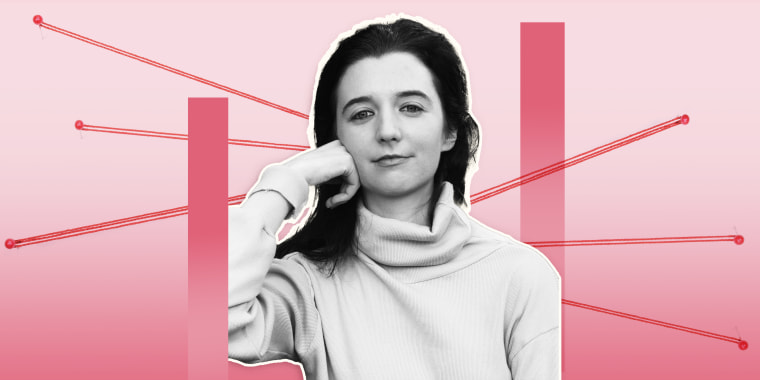Before Molly Godfrey, 29, fell deeply in love with her now ex-boyfriend, Chris, she was “very much a withholder.”
“I would suppress things, withhold things, I would wait for people to come and get me and figure things out instead of just being honest about what was going on,” Godfrey, a Brooklyn-based dating and relationship coach, told TODAY.
Chris, who she started dating in 2017, was her first serious relationship, she said, “and so there were a lot of unexamined things” about herself.
Here’s what Godfrey, who originally wrote about the experience for P.S. I Love You, learned from the relationship.
Resolve conflict with attention, not pressure
The former couple dated for over a year, and eventually moved in together. At one point, Godfrey realized Chris was becoming unresponsive and distant.
“I think when we're in the midst of a conflict, there can be a discomfort and desire to feel connected again, to feel each other again and to want a resolution and to make up and get to the other side,” Godfrey said.
Rather than pushing for a resolution, Godfrey reflected back on what started the disconnect in the first place.
“How can you use your attention to really trace back and be like, ‘What am I actually upset about? What am I actually feeling? What is this really about?’” she said.
She recalled getting prickly with Chris earlier in the day, after he gave her unsolicited advice about a work project.
“I wasn't looking for any advice,” she said. “Like, I didn't communicate that. So in that moment, my heart closed to him, because I got annoyed.”
For the rest of the day, Chris was distant.
“When I looked at, ‘Well, why are we not feeling as connected?’ I then traced it back to that, how he was trying to be helpful and provide and show up for the relationship, and I didn't adjust to him.”
One of the major lessons she learned, she said, is to trace back to the underlying problem that is causing the disconnection, otherwise “it will keep coming up.”
“So, doing your own self work, showing up to the relationship with your own sense of personal responsibility and self-awareness,” she said.
Agree to stay connected even when you’re mad
When Godfrey got into arguments with previous romantic partners, she would punish them by withdrawing and waiting for things to blow up before having a conversation, she said. “I think that's the root of all disconnection in relationships,” she said, “when things happen and the person withdraws and retreats and we can't feel them anymore.”
During arguments, she learned that it’s important to agree to reconnect and talk about the problem when you’re both calmer, she said.
“Like, ‘Hey, this sucks, I'm mad at you right now, and I still want to feel you, I still want to be connected to you, I don't hate you, we're gonna process this and figure out what we both need later today, but we can still stay connected,’” she said. “‘I can still check in on your day, we can still talk, and we'll get to the root of this later.’”
Be honest with yourself and try to see your partner clearly
Identifying the underlying problem causing disconnection ultimately led to the end of Godfrey's relationship. She said she loved Chris and he loved her, but they eventually came to the conclusion that they wanted different things. He wanted to move to San Francisco, where he landed a new job, and she wanted to stay in New York City, where she could be closer to her family.
“We weren’t honest with each other, so we just kept getting in the same argument over and over again, and then finally, when we got to this like, we love each other, and this isn't an honest connection anymore. So, even though it sucks, it's going to be painful, and it's going to hurt, you need to take that job, you need to move to San Francisco, and I need to create this life in New York myself.”
Even though they broke up a year after dating, she said: “The purpose of the relationship worked, we transformed, we grew, we healed.”
Godfrey learned that staying connected also means being honest with yourself about who you see standing in front of you. She said it’s important to understand that “your partner is their own person.”
“They're their own person with their own desires, their own needs, their own experiences, their own frameworks, they’re not you,” she said. “And so learning and accepting ... them for who they are and their own journey and being able to love them there and choose them” is a valuable lesson.



